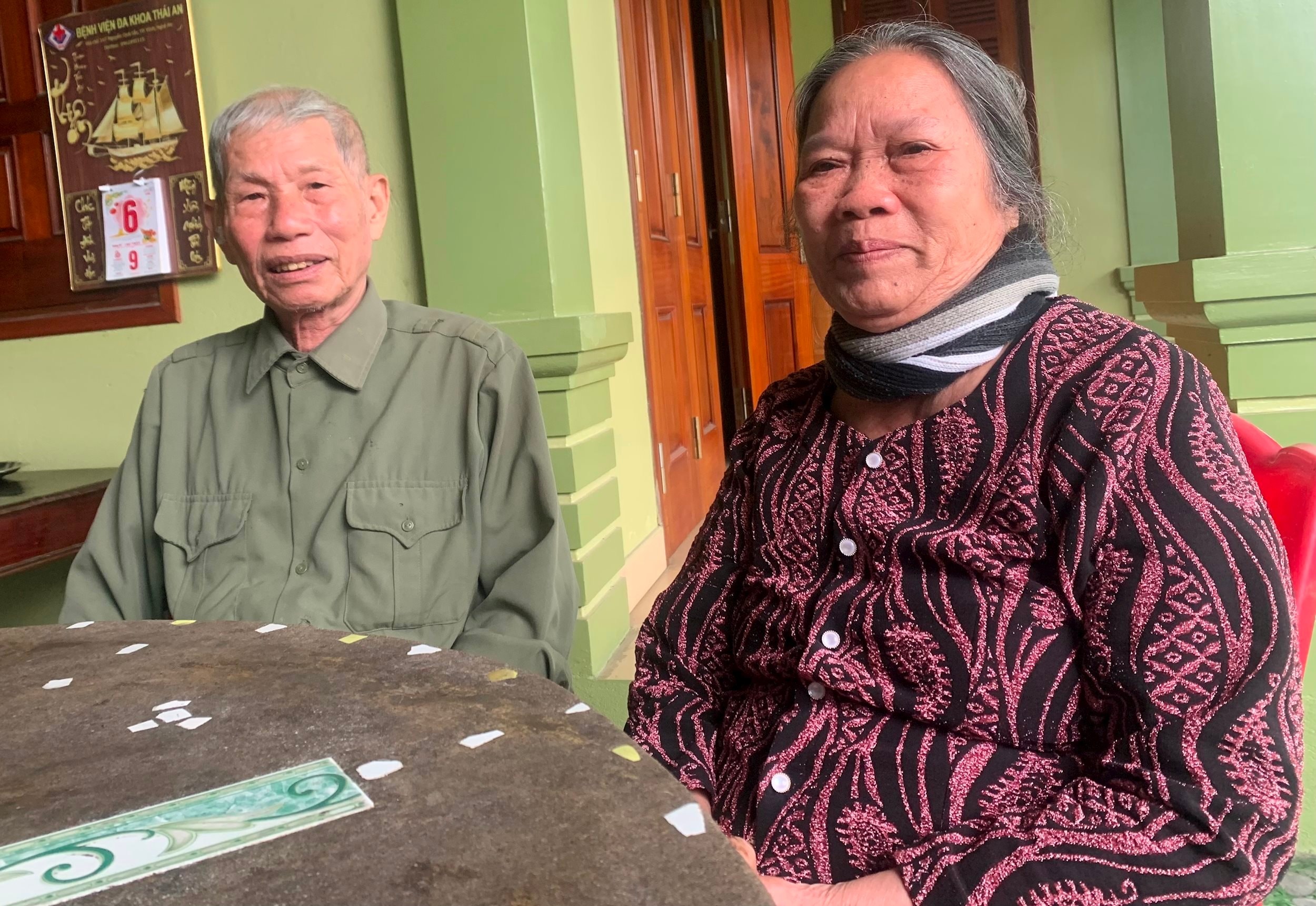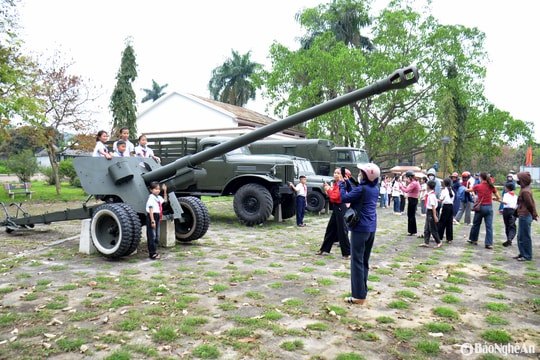Nghe An veteran and the story of almost 'capturing' an American plane on Co Pung peak
Veteran Nguyen Hong Thang (78 years old) is as gentle as any other farmer in the countryside. But his memories of the battlefield before 1975 made us shocked. His wife, who was listening, shed tears of excitement, worry, and emotion when she learned that her skinny husband was rolling around in the bombs and bullets of the battlefield, especially the battle with his comrades that almost "captured" an enemy helicopter.
Burned 2 enemy helicopters for more than 1 hour
On April 6, 2025, we visited veteran Nguyen Hong Thang's house in Hong Thai hamlet, Thong Tan commune, Hung Nguyen district, to hear him recount his battlefield exploits in battlefield B, Western Thua Thien Hue.
The details of each battle are still fresh in Mr. Thang's memories as a soldier. He said: "On July 15, 1970, the 3-man Special Forces Reconnaissance Team, led by me as the leader (equivalent to a Squad Leader) of the Special Forces Reconnaissance Company C20 (C20), Division 324, was leaving the plains to return to the rear base. When we reached the peak of Co Pung, at an altitude of 1,440m (Western Huong Dien district, Thua Thien Hue province), we saw an A-shaped bunker, so the whole team stopped to open rice balls for lunch. In the middle of the meal, without bowls or chopsticks, we heard the sound of helicopters continuously hovering overhead. We thought the enemy was flying reconnaissance, but soon after, we saw them landing. Because the distance was only 20m, we saw all the American soldiers, a platoon in number."

The reconnaissance task force predicted that the enemy would launch a sweep of this area in order to block our supply route from Che Cave on Highway 14 to the border area. Team leader Thang was trying to swallow the last dry piece of rice when the enemy landed troops for the second time. This time it was a helicopter with the code HU1A belonging to the US 101st Airborne Division. "We knew that the team only had 3 AK47 riflemen with folding stock, but we were in an active position so we could open fire suddenly to destroy the plane," said Team leader Thang. Immediately after that, he and 2 fellow soldiers Nguyen Van Minh and Tran Van Thu came out of the tunnel mouth and opened fire simultaneously. The HU1A plane caught fire on the spot. All the US soldiers jumped into a bomb crater right next to the landing zone. It was 10:15 a.m. that same day.
- Why is there a bomb crater here? We asked in surprise. Veteran Thang explained:
- Before bringing tanks to the top of the forest or landing troops on a hill, the enemy used planes to drop bombs. After the bombs had plowed up the hilltop, the enemy used bulldozers to level the hill to clear the forest, avoiding being ambushed nearby by the liberation army.
But the “encounter” with enemy aircraft did not end there. Veteran Thang continued to tell of another “encounter” that occurred 55 minutes later that day with an American “duck-roller” aircraft (OH 6 Cayuse - this type of aircraft has very special features. While flying, it can stop and then suddenly “lift” straight up. It can fly low, weaving through mountainous terrain). “At 11:10 that day, the top of Co Pung was still smelling of the wreckage of the HU1A plane when a “duck stick” appeared, flying close to the landing area, “firing” 12.7mm continuously. When it flew over the mouth of the A-shaped bunker, the Special Forces Reconnaissance Team saw that it was a “good deal” so they put their guns against a tree trunk and fired immediately. The “duck stick” fell on the spot. The enemy panicked and retreated. I checked and found out that each person had fired 3 rounds, there was only 1 round left in the gun, so I directed my brothers to crawl through the cover of the saddle of Co Pung Pass and retreat. That lightning battle and great victory was highly appreciated by the division and the Reconnaissance Team was awarded 3 Third Class Military Exploit Medals,” veteran Thang recalled.
Almost "captured" a helicopter
Speaking of this, veteran Thang remembers that night of July 15, the Voice of Vietnam radio reported: "The Thang-Minh-Thu Reconnaissance Team was as quick as a squirrel, as strong as a tiger." The news story eloquently told the story of when, on the way back from a mission in the plains, they encountered an enemy landing. The Reconnaissance Team broke up the landing by shooting down two helicopters within more than an hour. Veteran Thang made a comment full of the battlefield atmosphere: "In that battle, we were not the active side. We were surprised. But when a soldier sees the enemy, he fights. When the enemy comes to his house, even women fight. That is the courage of a soldier when facing the enemy."

In April 1973, squad leader Thang became the C20 Company Commander. At that time, using radio communication from the PRC 25 radio of the technical reconnaissance unit, Platoon Leader Ho The Luan discovered a commando team operating on a grassy hill, 500m above sea level in the forest in Phong Dien district (Western Thua Thien Hue). Under the order of the Division, Chief of the 2nd Special Forces Reconnaissance Team Le Huy Mai directly assigned the task to Company Commander Thang to command a team of 10 selected reconnaissance special forces soldiers to attack and capture this commando team.
Captain Thang divided the team into two groups. Team 1 was commanded by Captain Thang. Team 2 was commanded by Platoon Leader Nguyen Van Minh. On April 6, 1973, the two groups followed the enemy's footprints to search for clues. At 8:00 p.m., Team 2 discovered six commandos sleeping on the hill, with one soldier standing guard outside. Both groups decided to advance into the hill, approaching the commando team's position and shouting: "Charge!" "Surrender or live. Resist or die." The commando team was sleeping, without the slightest resistance. Only the guard escaped.
After releasing the prisoners for exploitation, the Division used the strategy of "using the enemy to fight the enemy". That is, choosing 5 experienced scouts, pretending to be commandos who had just been captured, wearing camouflage clothes, carrying AR15s (American super-fast submachine guns) and lying in ambush on Hill 500 so that when the commando team "called for a helicopter to save their lives", the 5 scouts would rush onto the plane, overwhelm the soldiers in the plane and control the pilot according to the Division's intentions.
The reconnaissance team led by Captain Thang prepared the fake battlefield and landing site, but when the 2nd Section and the Division feared that it would not be safe, they sent the 37th Infantry Company and the 12.7mm artillery unit to support. The mobilization process slowed down the time according to the default plan. Meanwhile, the surviving commando used a reflective mirror to "catch" contact with the enemy helicopter, and the helicopter used a rope ladder to rescue them. The ruse was exposed. The reconnaissance team led by Captain Thang had withdrawn less than a kilometer when the landing site on Hill 500 was blown up by enemy bombs and bullets.
25 years of experience in making a living
After the historic 1975 Spring Campaign, Captain Thang was the Chief of Reconnaissance of Regiment 3, Division 324. In 1977, he held the rank of Senior Lieutenant, performing an international mission in Laos. In 1981, he was the Chief of Reconnaissance of Division 336 in Central Laos. In 1983, the soldier who almost “captured” an enemy helicopter became a veteran.
He recalled the touching situation: “At that time, the country was in a very difficult situation. My wife had to work hard to make ends meet. Sometimes there was not enough rice, so she had to cook porridge to share with the children. I repaired bicycles and took the opportunity to sell cassava all the way to Kim Lu Station, Tuyen Hoa District, Quang Binh Province. It wasn’t until 1995 that things got better. A bamboo house was extended and replaced with two mahogany houses. Now, after the third renovation, we have a level 4 house with solid walls.”
Mrs. Le Thi Thanh, Mr. Thang's wife, sat listening to her husband recount the battles of more than 50 years ago on the battlefield, and could not help but be shocked. She suddenly asked: "When you are a company commander, do you still directly lead each unit to battle like when you were a squad leader?" Veteran Thang looked at his wife and smiled gently: "On the battlefield, being a leader does not mean staying at home or in the command bunker. The most important and tense battles require experienced people. That is why the unit leader goes into battle."
This detail made the veteran's wife even more shocked. She turned her face, wiped away her tears, and emotionally said: "My husband and I are now old and toothless, but now that the journalist asked me about it, I just heard my husband tell the story. Luckily, my husband is still alive to return, otherwise if he had sacrificed back then!... A small salary is fine. No matter how difficult life is, my family has overcome it. The children are all grown up. Looking at him so thin, I feel sorry for him."

.jpg)

.jpg)
